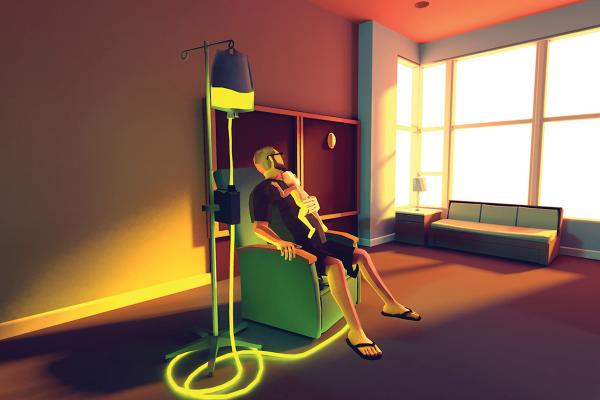WHEN WE THINK OF ART, we usually think of paintings, literature, or film: media that take us outside of ourselves and help us experience a time, place, feeling, or philosophy. Works of art have the potential to move us, sometimes profoundly.
What we don’t think of—not immediately, anyway—are video games. Games are artifacts of pop culture. At best, they’re fun, relatively benign distractions. At worst, they’re violent, desensitizing affairs promoting antisocial behavior. Video games are not, generally speaking, considered transformative or artistically ambitious.
But that might be changing. In recent years, developments in the gaming world covering everything from graphics to narrative structure are changing the low-culture perception of video games, with complex stories that challenge players and sometimes even help them consider the theological.
“Video games are this amazing reflection of how we see the world,” video game developer Ryan Green told Sojourners. “There’s a relationship between the player and the creator of the game that also reflects how we view God. You can see the hands of the designer at any given point.”
Letting love change you
Green and Numinous Games, the production company he co-founded with Josh Larson, are at the forefront of this movement. Along with Green’s wife, Amy, they’re the creators behind That Dragon, Cancer, a game detailing the emotional and spiritual journeys of the Greens during their son Joel’s four-year battle with cancer, from which he died at age 5.
That Dragon, Cancer is an empathy game, a video game allowing players to interact and identify with a specific emotional or social experience, with the goal of making the player more sensitive to the issue it presents. In the case of That Dragon, Cancer, the Greens invite players to share their process of hope, doubt, and mourning through a series of interactive vignettes reflecting their experiences during Joel’s illness.
“We created this world and included my son in it to get you to love him, and through that love, let it change you,” Ryan Green said. “That’s a parallel to how I see the gospel. Part of the design is acknowledging the player and saying, ‘I know how you feel.’”
The Greens began making That Dragon, Cancer while Joel was still alive. At the time, he was living past the doctors’ projections and hitting growth milestones, such as walking and speaking, that his parents had been told not to expect.
“While Joel was alive, we thought we were going to see a miracle, and we constructed the game the way you would a testimony,” Amy Green told Sojourners. “When he died, we went through a process of [asking], ‘Why are we doing this?’ We decided we wanted it to say what it was like to be with Joel, and what it was like to play with Joel.”
The result is a beautiful, bittersweet game about loss, parental love, and a changing understanding of God. It’s a game that is strikingly honest about its creators’ faith and doubt, with Ryan and Amy Green often expressing their thoughts in the form of a diary-style voiceover.
“We started with the idea that we’re going to teach the player something,” Ryan Green said, “but then we learned that we don’t have that surety. The reality now is that we’re asking more questions [in the game], and we’re not offering all the answers.”
The Christ-like side of the industry
Writer Drew Dixon has been a fan of That Dragon, Cancer since the project’s early stages. Dixon is editor-in-chief of Gamechurch.com, a website publishing theologically informed reviews of video games, which doubles as an outreach ministry to the gaming community.
“I don’t think any game [before] has made me weep,” Dixon told Sojourners. “I have two daughters, and to this day I can’t play the game without thinking of them.”
Dixon says the game stands out because of what it says about the role of mourning in creating a deeper relationship with Christ.
“Jesus understood the value of grief and lived it out with us. That’s what [That Dragon, Cancer] is about to me. It’s not that grief is easy, but that grief is good. It’s that the call to love your neighbor means that you have to be willing to suffer with them.”
Dixon says he’s a believer in the potential of empathy games, and named a few he found to be mind-expanding experiences, such as Papo & Yo, a game about living with an alcoholic parent, or Cart Life, about the challenges of low-income single parenthood.
“This is the Christ-like side of the industry,” Dixon said, “to share the plight of the immigrants, or to have to make it in a harshly capitalistic world, or to have a child who you can’t save from cancer. [Empathy games] help you recognize the image of God in others.”
The mechanics are the message
When watching a film, we rely on a variety of elements to communicate meaning, from story to acting to cinematography. For video games, Dixon says, the vehicle for communication is slightly different.
“Some games really are cinematic experiences, where you’re just controlling the camera,” Dixon said, “But most rely on how you interact with the game. That’s how they tell their story.”
The kind of story a game tells, and what tools it gives the player to take part in that story—whether it’s battling alien hordes, solving a mystery, or building a criminal empire—are known as the game’s “mechanics.” Dixon says many mainstream games use these interactive elements in a negative way.
“Lots of mechanics can be used to tell a dishonest story,” Dixon said. “For example, in games like Call of Duty you fix all of the problems in the game by destroying the enemy.”
However, there are games changing that trend, most developed by independent companies, such as the Greens’ Numinous Games and The Fullbright Company, creators of the game Gone Home, which Dixon cites as a well-considered use of mechanics to communicate message.
Gone Home puts players in the shoes of Katie Greenbriar, a college student returning to her family home from a year abroad, only to find an empty house and a cryptic note from her sister, Sam. As Katie, players explore the Greenbriar home, slowly uncovering what’s happened.
Gone Home is a story-exploration game, meaning that players are allowed to freely interact with their environment, piecing together the story based on clues they find. It’s a form of narrative structure dictated less by action and more by the player’s emotional connection to the game.
“Many traditional games have the player interact with their world through some form of action—typically combat, sometimes shooting,” Kate Craig, a game designer at The Fullbright Company, told Sojourners. “When you remove the action-oriented verbs, like run or shoot, what you’re left with is a quieter environment that a player doesn’t need to rush through. They can take their time and look around without pressure or time limits.”
Craig says she’s glad to see the gaming industry turning toward an emphasis on intimate, detailed storytelling.
“Writers are hugely important in the creation of a strong game and I’m delighted they’re finally starting to get the appreciation they deserve,” Craig said. “I hope [narratively detailed games] can stand alongside traditional games but offer something different in theme and approach, and hopefully appeal to people that might not have been interested in games in the past.”
A new kind of fellowship
Just as with any form of narrative art, Dixon says video games can communicate a point of view worth considering and exploring.
“If everyone is made in the image of God, that means that everyone has something they’re offering us,” Dixon said. “We [Gamechurch] choose to highlight truth and beauty in video games ... and we also note when that truth and beauty is being discarded.”
And just as the creative process behind a novel, film, or painting can transform both artist and audience, so can the creation of a game be transformative for players and designers.
“We went into presenting That Dragon, Cancer like a lot of Christians do about putting something into popular culture,” Amy Green said. “We were expecting pushback, and we were amazed at how little there’s been. I think that’s due to the fact that we’re telling our own story.”
In fact, reactions to the game at industry conferences have brought moments of deep emotional connection. “We’ve had lots of hugs, with every type of person,” Ryan Green said. “It’s this fellowship I didn’t anticipate, but now I can’t give it up.”
Ryan Green says that fellowship, interacting with players and other game developers, has been a life-changing experience.
“It’s made me want to be a peacemaker, not a culture warrior,” Ryan Green said. “Why pick a fight with the people we should be hugging?”
Note: This article has been updated from the print version to correct an error in the naming of the co-founders of the Numinous Games production company.

Got something to say about what you're reading? We value your feedback!

